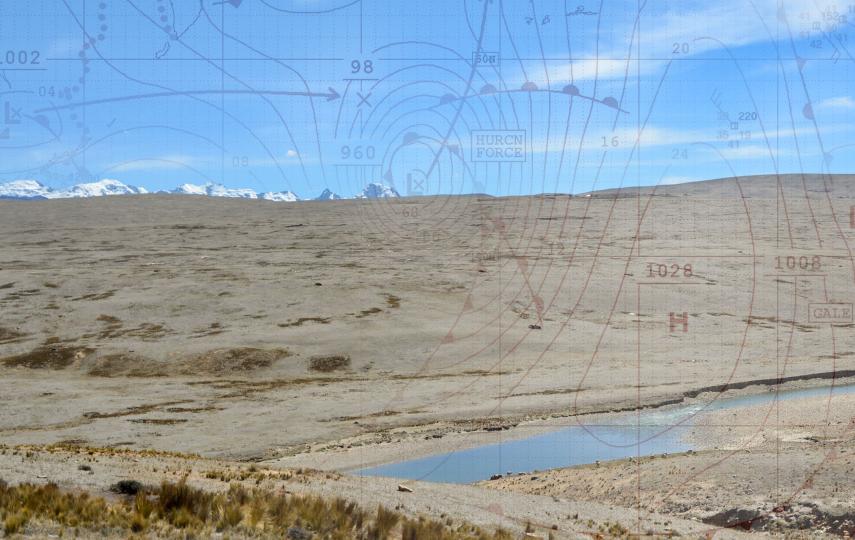Ahead of crunch talks to sort out divisions in time for the COP28 climate summit, the Pakistani politician who led negotiations to secure global agreement on a fund for climate loss and damages has lambasted the “burden” on vulnerable countries to identify money for the body.
Sherry Rehman, Pakistan’s former climate minister, was lead negotiator on the contentious issue of loss and damage for the Group of 77 – a collection of 135 low- and middle-income countries – at the COP27 climate summit in Egypt, where a breakthrough deal saw a commitment to set up a dedicated fund to help countries suffering from the destructive impacts of climate change.
But the negotiations to establish the practical workings of that loss and damage fund have since been fraught. And with just two months until this year's COP28 climate summit, how the fund will be financed remains a key division.
“I don't understand why we are being burdened to create that money, to identify [it],” Rehman told The New Humanitarian, answering a question last week during an online event. “I'm sorry, that's not my problem.”
“That is not the problem of a country that is struggling under the… unrelenting trajectory of emissions that are setting us on the path of clear armageddon,” she added. “But we are the front line of that armageddon.”
Rehman’s comments come as negotiators from countries from both the Global North and the Global South, known as the Transitional Committee, are set to meet on 17 October for a fourth and final time before COP28.
Campaigners say this meeting must lay the groundwork for an agreement if a loss and damage fund is to get up and running at COP28 – widely viewed as essential to the success of this year’s climate summit, which begins on 30 November in the United Arab Emirates.
Pakistan suffered devastating floods in 2022, which the government said submerged a third of the country. The disaster cost $30 billion in damage and economic losses, and $16 billion in reconstruction costs, according to the World Bank – the kind of costs a future loss and damage fund is intended to help provide for.
Rehman, whose government was a leading advocate at COP27 for a loss and damage fund following the disaster, said it was the job of polluting countries to create a fund that “builds trust” and “bridges the financing gap. That is the chokehold on everything, pretty much.”
A major reason for the slow progress of the broader international climate negotiations has been the mistrust created by high-income countries – whose historical fossil fuel emissions created the climate crisis – failing on a promise to deliver $100 billion a year in climate finance to the Global South by 2020. This money is for both mitigation and adaptation, reducing emissions and reducing risks from climate threats, respectively. The target, which does not include loss and damage finance, is expected to be met this year, though Global South countries say their finance needs are far higher now as the climate crisis has progressed.
The governments of the wealthy countries most responsible for climate change, especially the United States, have long been wary of agreeing to loss and damage funding, given the potentially huge costs involved.
Influential developing country negotiators, like Avinash Persaud of Barbados, have called for the fund to receive $100 billion a year in grants. But amid strained public budgets, many politicians are reluctant to make further climate finance commitments, despite the massive scale of need. This means the basic question of how to finance the loss and damage fund remains unanswered weeks before COP28 is set to begin.
Developing countries have been demanding broad eligibility to access the loss and damage fund, and for it to be financed by grants – on top of existing aid and climate finance commitments – to avoid further debt burdens.
So-called innovative finance, like carbon taxes and repurposing fossil fuel subsidies, has been widely touted as a way of making up the shortfall.
But Rehman rejected the idea that middle-income countries like India, Pakistan, and Libya – whose emissions are rising – should pay a carbon tax, which she said “can pass on additional costs to those that are already economically fragile”.
“If there is a carbon taxation discussion, it has to be for those who can pay now under the common but differentiated responsibilities,” said Rehman, referring to the principle – globally agreed in 1992 at the UN – that some countries have more duty than others to tackle the climate crisis.
Rehman also worried that the loss and damage agenda could continue to lag behind the more established climate policy areas of mitigation and adaptation at COP28. She called for it to be included at the summit in the so-called global stocktake process – a comprehensive review of the world’s climate progress and gaps.
Without being integrated into other climate policy areas, “I fear the loss and damage fund will just become a passing fancy, and it will become… a ghost fund… not capitalised and it's barely used,” Rehman said.
Edited by Irwin Loy.






